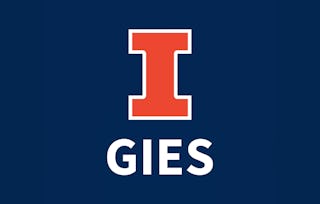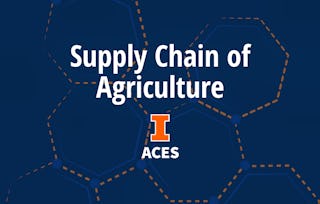Learners in this course will examine global trade agreements -- including policies, barriers, and regulations -- of agricultural commodities, and discuss implications of world and economic disruptions on the food supply chain. Throughout this course, learners will also discuss issues of sustainability, technology, and the environment as it relates to the supply and distribution of food products.

Issues in Supply Chain Management
Ends soon: Gain next-level skills with Coursera Plus for $199 (regularly $399). Save now.

Issues in Supply Chain Management
This course is part of Agribusiness and Sustainable Food Production Economics Specialization



Instructors: Paul B. Stoddard
2,611 already enrolled
Included with
(15 reviews)
Recommended experience
What you'll learn
Discuss the influence of trade policy and international relationships on food supply and demand.
Compare and contrast differences in world demand for food products between developing and developed countries.
Examine the impacts of compliance with environmental regulations on food supply chains.
Discuss future technologies that may influence issues in the supply chain of food and food products.
Skills you'll gain
Details to know

Add to your LinkedIn profile
See how employees at top companies are mastering in-demand skills

Build your subject-matter expertise
- Learn new concepts from industry experts
- Gain a foundational understanding of a subject or tool
- Develop job-relevant skills with hands-on projects
- Earn a shareable career certificate

There are 4 modules in this course
In the course orientation, you will become familiar with the course, your classmates, and our learning environment. The orientation will also help you obtain the technical skills required for the course. In the second part of this module, you will explore global trade to identify the types of agricultural commodities, explain global trade policies and considerations specific to agricultural commodities, and examine the impact of global currencies on trade.
What's included
10 videos4 readings2 assignments1 discussion prompt
In this module, you will describe the purposes and impacts of agricultural trade agreements and examine the barriers to global agricultural trade.
What's included
9 videos3 readings1 assignment
In this module, you will describe the growth of agricultural commodities in South America, examine implications of world and economic disruptions on the production and trade of commodities, and compare the demand for food products between developed and developing countries.
What's included
6 videos1 reading1 assignment
In this module, you will identify and describe the impact of technologies on food production, consumption, and demand. You will also discuss the opportunities and threats of feeding the world while also sustainably producing and distributing food and food products. At the conclusion of this module, you will be ready to complete the final assessment for the course and earn your Coursera certificate!
What's included
9 videos8 readings2 assignments
Earn a career certificate
Add this credential to your LinkedIn profile, resume, or CV. Share it on social media and in your performance review.
Offered by
Explore more from Business Strategy
 Status: Preview
Status: PreviewUniversity of Illinois Urbana-Champaign
 Status: Free Trial
Status: Free TrialUniversity of Illinois Urbana-Champaign
 Status: Free Trial
Status: Free TrialUniversity of Illinois Urbana-Champaign
 Status: Preview
Status: PreviewTechnical University of Munich (TUM)
Why people choose Coursera for their career




Learner reviews
15 reviews
- 5 stars
93.33%
- 4 stars
0%
- 3 stars
0%
- 2 stars
6.66%
- 1 star
0%
Showing 3 of 15
Reviewed on Jan 15, 2026
highly information-dense, very relevant for food industry professionals
Frequently asked questions
To access the course materials, assignments and to earn a Certificate, you will need to purchase the Certificate experience when you enroll in a course. You can try a Free Trial instead, or apply for Financial Aid. The course may offer 'Full Course, No Certificate' instead. This option lets you see all course materials, submit required assessments, and get a final grade. This also means that you will not be able to purchase a Certificate experience.
When you enroll in the course, you get access to all of the courses in the Specialization, and you earn a certificate when you complete the work. Your electronic Certificate will be added to your Accomplishments page - from there, you can print your Certificate or add it to your LinkedIn profile.
Yes. In select learning programs, you can apply for financial aid or a scholarship if you can’t afford the enrollment fee. If fin aid or scholarship is available for your learning program selection, you’ll find a link to apply on the description page.
More questions
Financial aid available,
¹ Some assignments in this course are AI-graded. For these assignments, your data will be used in accordance with Coursera's Privacy Notice.






